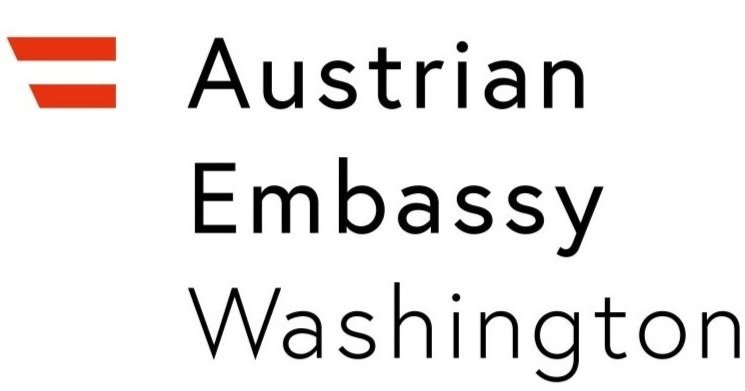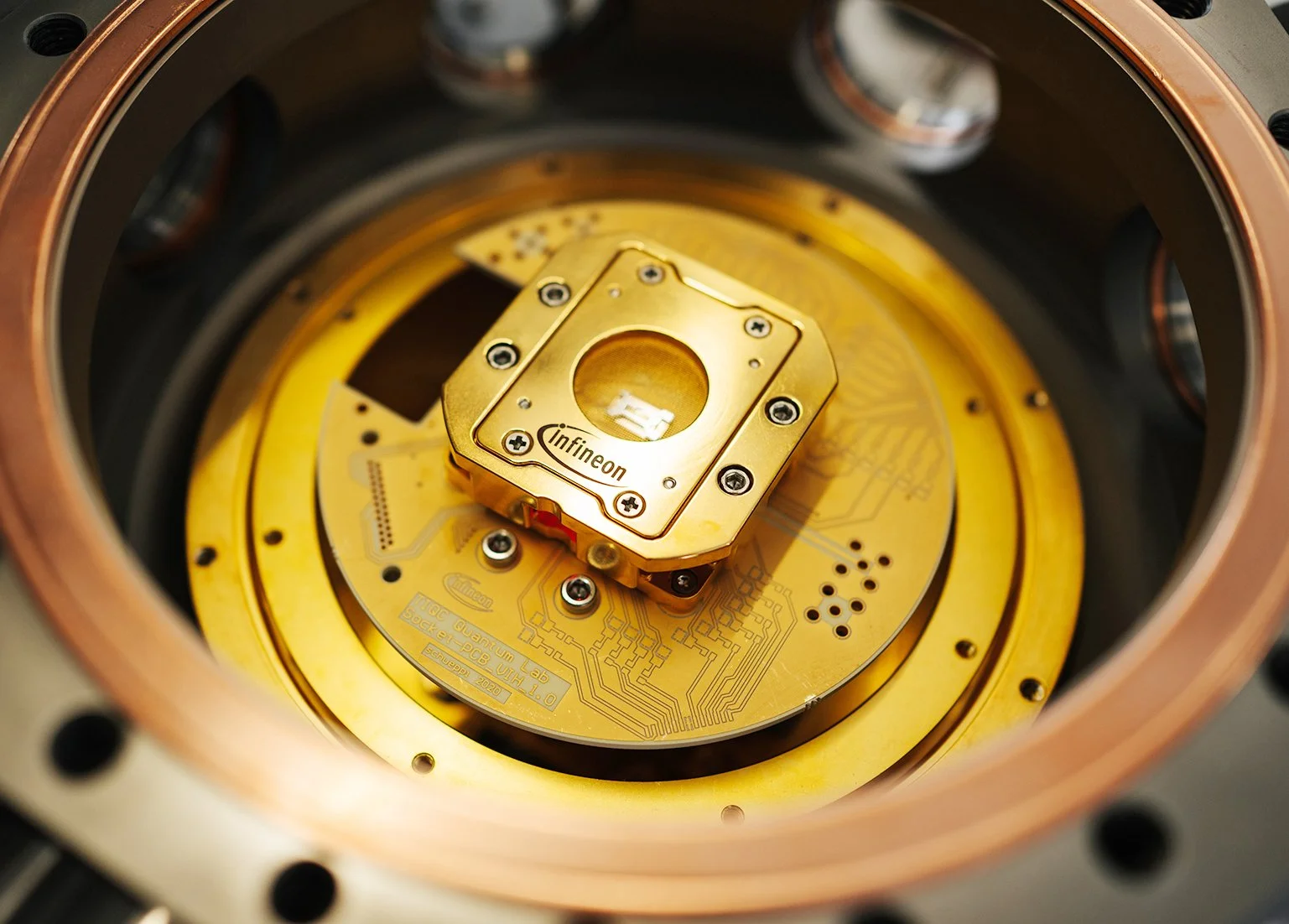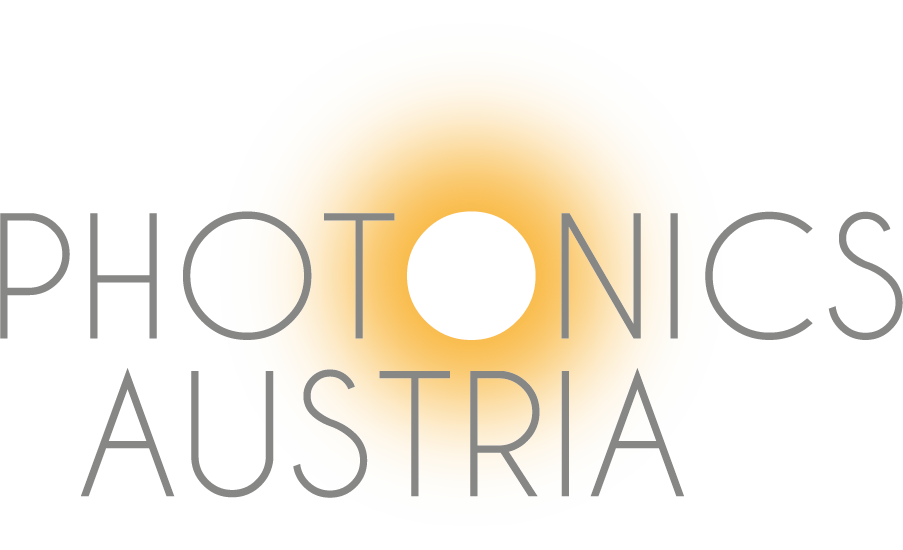Austria: A Quantum Innovation Powerhouse
Initiated by the Austrian Government, the Austrian technology platform Photonics Austria was founded by representatives from industry and research in order to establish a strong presence of photonics stakeholders at national and international level and to promote the exchange between business, research and education. The main tasks of Photonics Austria are to develop and support national and international research strategies and programs and to promote networking with European photonic activities, as well as to offer an exchange platform to national actors. Photonics Austria offers contact and cooperation to over 60 Austrian key stakeholders in Photonics and Quantum technologies through a wide range of activities like matchmaking, delegation visits or joined R&D projects.
Infineon Technologies Quantum Processor
Photo: Infineon Technologies
In 2025, the International Year of Quantum Science and Technology, Austria reaffirms its position at the forefront of quantum innovation. The particular strength of this ecosystem is originating in a vital academic environment, which has been alive for 100 years of Nobel Prize-awarded research, starting with the work of Wolfgang Pauli and Erwin Schrödinger, and continuing with Anton Zeilinger and fellow researchers in recent times. The platforms Quantum Science Austria (quantA) and PHOTONICS AUSTRIA are proud to unite diverse networks of academic and industrial leaders. In the case of Photonics Austria, these collaborations go from advanced optical chip fabrication for quantum computers to groundbreaking sensor and communication technologies. Together, they are all contributing to a transformative quantum future.
JOANNEUM RESEARCH
JOANNEUM RESEARCH is an internationally recognized research and technology organization in Austria. The focus on applied research and technology transfer to companies puts the organization at the forefront of Austrian stakeholders for commercialization of R&D in several key enabling technologies including:
Green photonics and electronics
Structured (biomimetic) surfaces
Piezoelectric sensors and energy harvesters
Large-area production of organic layers (roll-to-roll, screen printing)
(optical) chemo- and biosensors
Laser production technology
Aerosol and inkjet printing
Laser and plasma-assisted vacuum coating processes
At the cutting edge of quantum photonics, researchers at the institute MATERIALS are developing femtosecond laser processing techniques to fabricate optical waveguides and interferometers for quantum computer and metrology concepts of the University of Innsbruck. By directly inscribing waveguides and other optical components into glass substrates with micrometer precision, they are creating essential hardware for reconfigurable quantum circuits. Miniaturization of macroscopic setups like, e.g., ion traps to semiconductor chips is key for bringing affordable quantum computers to the market.
Through its institute DIGITAL, JOANNEUM RESEARCH can also provide research and solutions in the software segment of quantum computing. It focuses especially on the fields of intelligent measurement technology and signal processing.
From the JOANNEUM RESEARCH laboratory
Photo: Bernhard Bergmann
Infineon Technologies – Quantum Processing Units: Infineon at the Heart of Quantum Computing
Quantum computing opens up new ways of tackling computational challenges in areas such as healthcare, cybersecurity, finance or logistics. Infineon, a leading semiconductor manufacturer, drives the industrialization of quantum computing from fundamental research into application for industries and partners worldwide. Quantum computers will boost innovation in many areas, e.g. in the development of medications or chemical catalysts by simulating processes on a molecular scale for a faster development of drugs and vaccines or new materials and hence boost innovations for example in renewable energy, electronics or aerospace. Another area where quantum computing is expected to bring economic value is real-time simulation in finance or logistics, to make supply chains more robust.
Enabling quantum computers to solve meaningful real-life issues requires controlling a large number of qubits with high precision, which exceeds the state-of-the-art capabilities available today. Infineon is actively boosting research and development in several quantum computing technologies, including trapped ions, superconducting circuits and spins in silicon. Infineon has state-of-the-art knowledge in process development, fabrication and quantum processing unit technology. This includes laboratories for quantum electronics as well as a dedicated ion trap test lab situated in close proximity to the chip production facility in Villach/Austria.
Infineon is also investing in major quantum computing efforts on trapped ions, specifically at the power semiconductor fab in Villach, Austria. A dedicated team is working on the heart of leading quantum computers - the trapped ion quantum processing units (QPUs). The company leverages its deep expertise in high-volume processing and developing technologies, like integrated photonics and control electronics, to enable partners to scale the qubit count of their machines.
Collaborating within a strong quantum ecosystem, including science, business, industry, and start-ups, Infineon is joining forces with academic partners like the University of Innsbruck, the German National Metrology Institute (PTB), and ETH Zurich, as well as commercial partners such as Quantinuum, Oxford Ionics or eleQtron. Together with these excellent and innovative partners, the company is pushing the limits of computing into a new era.
Alpine Quantum Technologies
Alpine Quantum Technologies, a start-up of the University of Innsbruck, is working on robust quantum computers that operate at room temperature. The systems, among the most advanced quantum computers in Europe, make use of the ion trap technology and laser manipulation of quantum states and have already been sold to several institutions throughout Europe.
RECENDT
RECENDT, Research Center for Non-Destructive Testing GmbH, is a research company with headquarters in Upper Austria/Linz. RECENDT researches and develops technologies for non-destructive testing and material characterization. These are used in projects with companies from a wide range of industries in order to develop customer-specific solutions. In this way, they enable process-integrated measurement, testing and characterization of products or process parameters.
Quality assurance for welding and bonding processes, for casting or 3D printing
Process-integrated chemical analysis, Hyperspectral imaging
High-resolution real-time 3D imaging of internal structures on a micrometer scale
Testing of ceramics, polymers, metals for internal defects
Biomedical imaging and point-of-care diagnostics
PAT (Process Analytical Technologies) for the chemical and biochemical industry
Testing and measurement of coatings
Analysis of fiber composites (CFRP, GFRP, etc.)
Food and food packaging
Process optimization through measurement technology and process understanding
RECENDT is making strides in quantum sensing. Their focus on nonlinear interferometry paves the way for industrial sensing and materials characterization with unprecedented accuracy. With plans to expand into magnetometry their research is set to bring cost-efficient, high-precision industrial measurement applications to the next level. RECENDT co-organizes the yearly Quantum Sensing Linz conference to showcase the latest achievements.
Photo: RECENDT
ams-OSRAM AG
ams-OSRAM AG is a worldwide leading, innovation-driven provider of optical solutions. With around 30.000 employees worldwide, ams-OSRAM provides innovations in the areas of sensor technology, lighting and visualization for safer travel, more effective medical diagnoses and more convenience in everyday communication. True to the motto: Sensing is Life, ams-OSRAM drives innovation for radically new applications that simplify our lives and reduce the impact on the environment. The company is constantly pushing boundaries and bringing technologies such as 3D sensor in cell phones to automotive or industrial robotics. ams-OSRAM AG makes technologies for groundbreaking applications a reality. This is reflected in over 15,000 granted and registered patents. ams-OSRAM AG offers complete optical systems from a single source. From emitters and sensors through to software the entire value chain of our customers can be served. Areas that are served include:
Automotive & Mobility
Medicine & Health
Mobile & Wearables
Lighting
Industry
Computers
Lab experiment photo from ams-OSRAM AG
Confronting the high costs associated with conventional InGaAs sensors, ams-OSRAM has developed a fully CMOS-compatible alternative using colloidal quantum dots (CQD). By replacing lead-based CQDs with RoHS-compliant indium arsenide quantum dots, their innovative prototype presented at the International Electron Devices Meeting 2024 demonstrates the ability to image through silicon wafers, a task impossible for standard RGB cameras.
Lab experiment photo from ams-OSRAM AG
zerothid
In the realm of cybersecurity, end-users are not looking to solve complex mathematical equations or navigate intricate IT solutions. Yet, many companies present precisely such complexity, leading to confusion and slowing down the adoption of critical security standards. This is a dangerous development, especially with the imminent rise of quantum computing. Experts predict that within the next five years, today’s encryption methods will become obsolete, leaving sensitive governmental and diplomatic communications vulnerable. The question is: how can we ensure secure communication in a way that is both effective and easy to adopt?
Imagine a security key that protects the most confidential communications against any third party, is never transmitted over a trusted or untrusted network, and is generated by light, which buy itself does not contain any information about the key. This is not science fiction—it is the law of physics that makes it possible.
Entanglement-based Quantum Key Distribution (QKD), developed by zerothird, enables secure key transmission over distances exceeding 300 km. This technology opens unprecedented possibilities: a highway for security keys along critical communication routes, secure key distribution between Brussels and Amsterdam or Brussels and Paris, direct, tamper-proof communication between government institutions and embassies, and a multi-party encryption service that ensures seamless and sovereign cybersecurity.
In cybersecurity, true value lies not in complexity but in simplicity and reliability. This is why zerothird, in collaboration with industry-leading partners, is building the secure communication networks of the future—a multi-billion-dollar market where early adopters will shape the landscape. If you want to be part of this transformation, connect with our leading experts and explore how we can redefine secure communication together.
Through the collective efforts of all of these trailblazing organizations, Austria is not only advancing quantum research but also translating visionary breakthroughs into real-world impact. With Photonics Austria, Silicon Austria Labs (SAL), the Austrian Institute of Technology (AIT) and others, a dynamic community works to actively drive the global quantum revolution, inspiring transatlantic cooperation and shaping the future of our lives.






